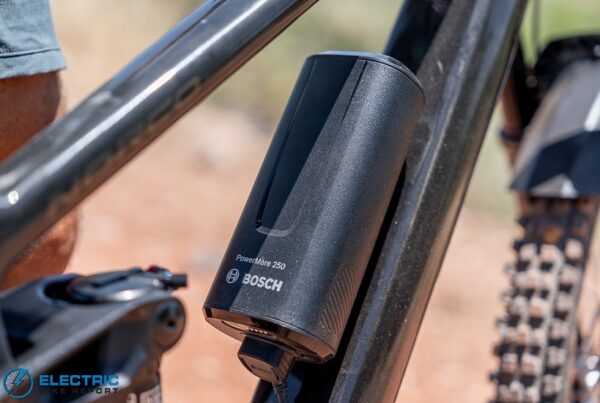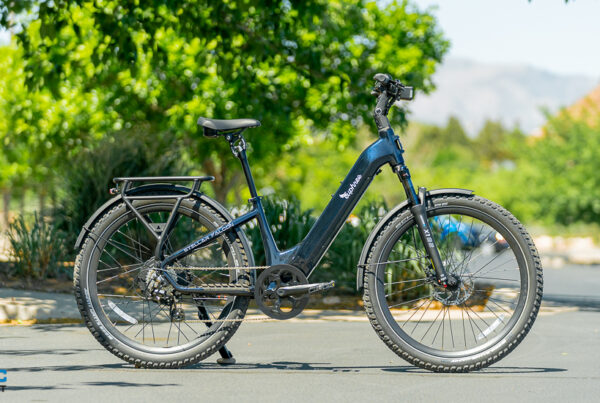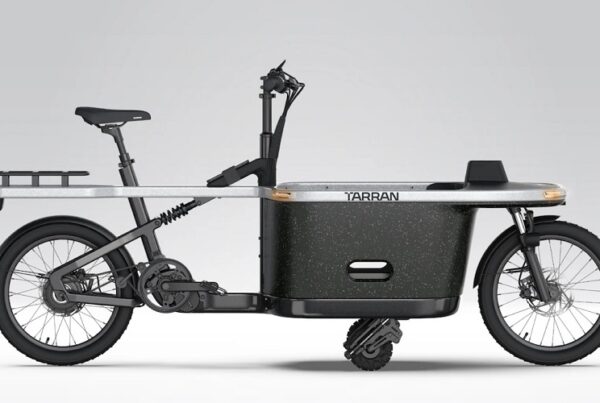Some links may be affiliate links. We may get paid if you buy something or take an action after clicking one of these.
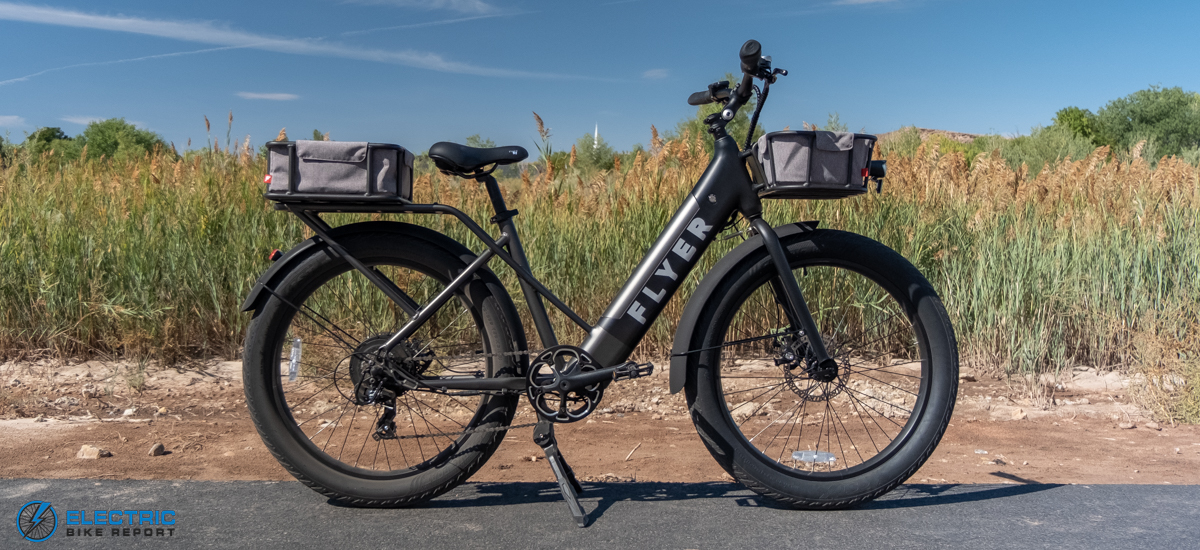
Radio Flyer M880 Review: Overview
The little red wagon company is diving headlong into the e-bike game.
Radio Flyer, a company synonymous with childhood nostalgia and classic Americana, is now making affordable electric cargo bikes. In this Radio Flyer M880 review, we’ll take an in-depth look at the company’s lighter-duty electric cargo bike that doubles well as a commuter or electric fitness bike.
Radio Flyer has dubbed its M880 e-bike, the smaller of their two debut models, a “midtail” electric cargo bike, meaning it has much of the carrying capacity of a full-size cargo bike but with the wheelbase and maneuverability of a normal e-bike. It’s a nice balance of everyday utility for running errands and getting to work, combined with riding characteristics that are just flat out fun.
The M880 we tested in this review is a pre-production version of Radio Flyer’s very first e-bike, so we do have some minor notes about power delivery and some other things, but by and large we were incredibly impressed with this bike. It’s very stable, versatile and predictable. With a carrying capacity of 300 lbs, a comfortable fit and a rear rack that’s compatible with accessories and child seats, Radio Flyer has clearly spent a lot of time thinking about how this e-bike could be used to replace car trips — I personally think they nailed it.
Bike Category: Commuter
Bike Class:Class 2: PAS/Throttle assist, up to 20 MPH
Radio Flyer M880 Video Review
 Pro’s
Pro’s- We’re a big fan of this bike’s overall presentation — It looks nice; it’s functional; and it rides very nice too.
- The 720Wh battery combined with the 500W motor give the bike a really impressive range. In both our range tests the M880 outperformed expectations.
- The rear rack has a 300 lb weight capacity and can accommodate a host of baskets and other accessories like child seats.
- The motor is exceptionally smooth and quiet. It lacks much of the vibration we get from other affordable hub-driven bikes.
- The moped-style kickstand is a very cool feature we wish more heavier e-bikes would come with. It makes storage easier.
 Con’s
Con’s- The display isn’t as feature-rich as some others we see at this price point, but it does give you all the important data and gets the job done.
- The bike’s very gentle acceleration slightly hampers your ability to maintain speed at higher speeds.
- The high carrying capacity does have a tradeoff — we noticed the frame felt a little stiff over bumpier surfaces.
ELECTRICAL SPECS & FEATURES
- Battery: 48V, 15Ah (720Wh) Li-Ion
- Display: LCD display
- Motor: 500W rear hub motor
- Headlight: Integrated LED headlight
- Taillights: Integrated LED tail light
- Peal Assist: Five pedal assist settings with a cadence sensor
- Range: 30 – 50-plus miles, according to Radio Flyer
- Throttle: Half twist throttle
Weight & Dimensions
- Claimed weight: 67 lbs
- Maximum rider weight: Total payload is 300 lbs
- Maximum load on rear rack: 80 lbs
Components & Accessories
- Brakes: Tektro Aries hydraulic disc brakes
- Fenders: Front and rear
- Fork: Rigid steel
- Frame: 6061 aluminum
- Drivetrain: Shimano Tourney 7-speed
- Gearing: 53t front chainring
- Grips: Rubber with an ergonomic shape
- Saddle: Selle Royale
- Handlebar: Flat bar
- Kickstand: Moped-style kickstand
- Pedals: Cromoly flat pedal
- Tires: CST Big Boat 26×3.0
Radio Flyer M880 Performance Review
Acceleration / Speed
The Radio Flyer M880 is a Class 2 e-bike with a throttle and five levels of pedal assistance that’ll power you up to 20 mph. It’s no speed demon, but the 500W rear hub motor cruised easily near its top speed of 20 mph and managed most hills with relative ease.
The motor had the most amount of pep when using the throttle with a slightly more subdued power delivery during pedal assistance. At 50 Nm it’s not the torquiest motor we’ve tested, but by golly is it smooth and very measured. I did notice a little hesitation from the motor when it kicked back on after coasting, but this doesn’t seem to be an issue of a slow-to-respond cadence sensor, but rather some gentle tuning on Radio Flyer’s part.
Range Test
Few electric commuter bikes we’ve tested have the battery range of the Radio Flyer M880.
To get an idea of an e-bike’s real-world range and to test the manufacturer’s claimed battery life, which in the case of the M880 was 30 to 50-plus miles, we conduct two range tests on our review bikes. The first is done in the highest assist setting and we typically do the second in the lowest assist setting.
Though the typical low assist, or PAS 1, range test does give valuable data, we did change things up during this review. Instead of PAS 1, we conducted the low assist range test on PAS 2. Why? Because the M880’s PAS 1 setting gives such little assistance I’m convinced the bike would have kept going for well over 100 miles. We opted for PAS 2 because it was the first setting that had any sort of noticeable assistance; the first setting that made the bike feel like an e-bike. This is actually something we see quite often on affordable hub-driven e-bikes, and something we’ll likely continue to adapt our testing for.
But despite upping the power, the Radio Flyer lasted well beyond the manufacturer’s claimed battery range. On maximum assist, or PAS 5, the M880 went for 36.65 miles before dying and on low assist, PAS 2 in this bike’s case, it went for an impressive 60.73 miles. Those figures are a testament to the 720 WH battery’s sizable capacity.
Like many e-bikes we test, the Radio Flyer seemed to die gently and gradually reduce power as the battery depleted. I do have one small gripe, though: The battery readout is difficult to track with. It’s your typical five-bar battery indicator, but instead of dropping bars sequentially, the readout would jump back and forth a bit. That’s not terribly uncommon, as many e-bike companies use an algorithm to determine battery life that takes into account your current motor usage and rate of charge. But where I was really thrown through a loop was when the bike finally did die, as the battery indicator was still showing one bar of life. So really, this five bar battery indicator is a four bar indicator — something we didn’t know until the bike actually ran out of juice.
Circuit test
We put all our review bikes through a gauntlet of testing on a roughly one mile circuit, a test meant to demonstrate the difference in power between each of the bike’s pedal assists settings. We did a total of six laps on the M880 around Electric Bike Report’s test loop, starting with a lap with no motor assistance and increasing the power setting by one for each lap after.
The Radio Flyer performed nicely among its Class 2 competitors, yielding a power profile that really shines on the upper three to four PAS settings. Like many bikes we test, PAS 1 didn’t offer much help aside from massive battery conservation. Where the bike really started to liven up was at PAS 3, which saw a 1.8 mph jump in average speed over PAS 2. There was another large jump between PAS 3 and PAS 4 before the bike got near its 20 mph motor-assisted ceiling.
These circuit test results are pretty typical of a solidly-tuned e-bike. There’s no enormous jumps in power and the steps between each level felt measured and appropriate. This bike’s PAS settings appear differentiated by speed versus available wattage, a feature I appreciated when climbing the small hill on our test circuit. Even in low PAS settings, the bike laid down a solid amount of torque on the hill; giving aid on the part of the loop that required it most.
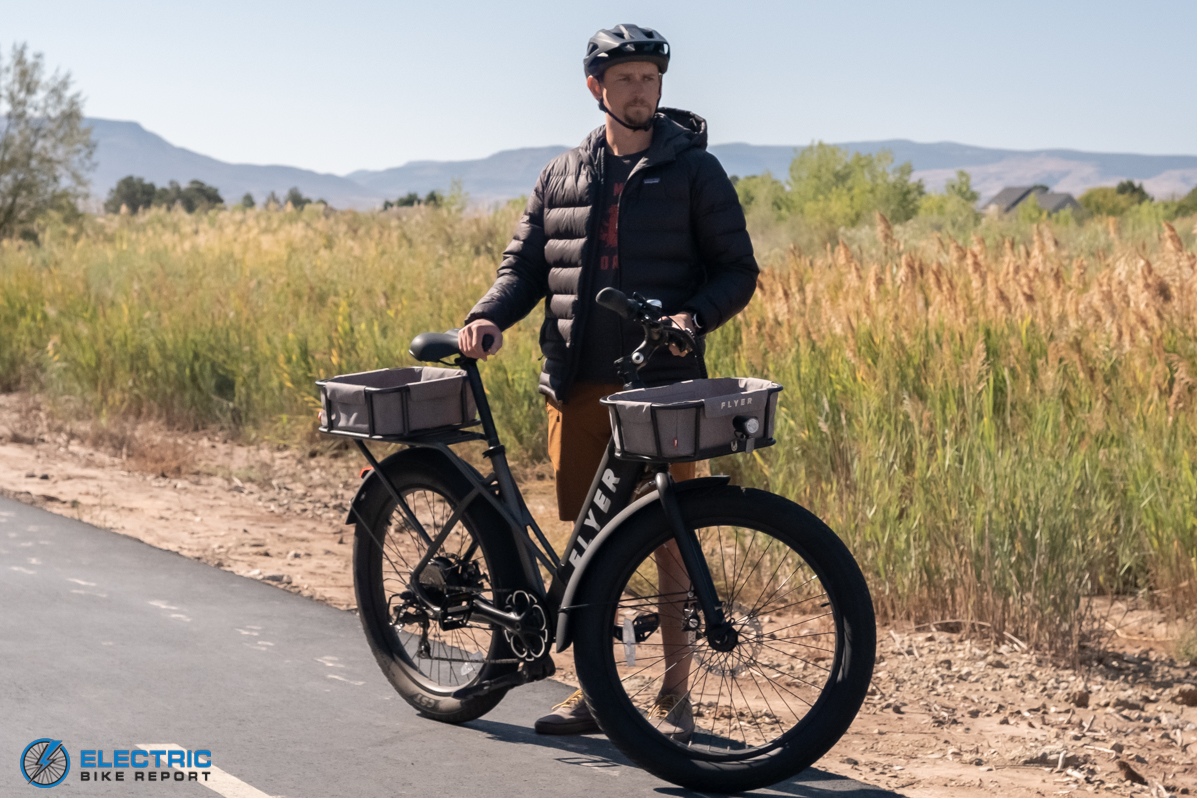
The Radio Flyer M880 felt most at home on bike paths. It’s predictable, comfortable and very smooth.
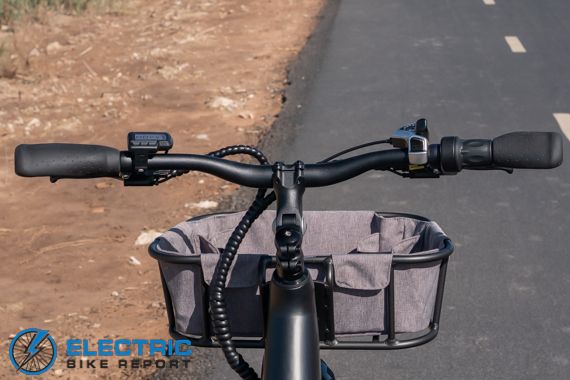
The M880’s cockpit is pretty clean. Radio Flyer did an impressive job keeping the cabling neat and tidy.
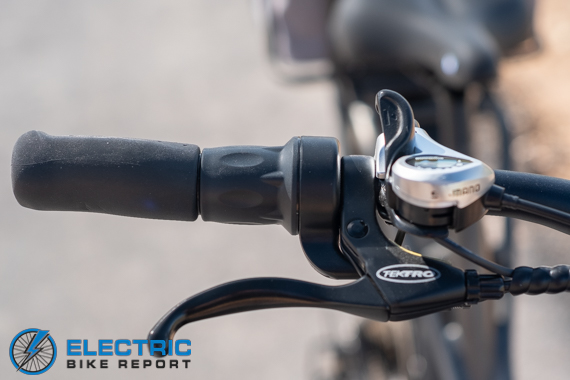
The M880 uses a 7-speed Shimano Tourney shifter, Tektro mechanical disk brakes and a half twist throttle on the right side.
Hill Test
Each e-bike we review at Electric Bike Report is put through our relatively rigorous hill test, where we do two laps on a local steep lovingly dubbed “Hell Hole.” That hill is about a third of a mile long with a grade that varies between 12 percent and 15 percent. The first lap of the hill is done under throttle power only, and the second is on maximum pedal assistance.
On maximum pedal assistance, the Radio Flyer crested the hill in 1:31.00 seconds with an average speed of 11.9 mph. And unfortunately in the throttle-only test Hell Hole got the best of the M880, and the bike was unable to get up the climb under motor power alone.
But before you go bashing the M880’s hill climbing performance there are some things I’d like to point out, including some bright spots. As I mentioned before, the M880’s 500W motor isn’t the torquiest we’ve reviewed — a fact that raised some questions on how it’d perform on the hill even before we conducted the test. But what it lacked in torque it made up for in incredible smoothness. Never once did the motor whine, vibrate or otherwise seem to struggle in either test. We’ve tested several e-bikes recently that vibrated uncomfortably up our test hill, and the Radio Flyer did none of that.
Also, though the hill got the best of the bike’s throttle, it really was impressive how little effort on my part it took to get the bike over the hill in the PAS 5 test. I was able to talk through the whole climb and felt like my heart rate only lightly lifted. It’s like the bike needed just a few extra Newton meters of force to make the difference.
Handling
The Radio Flyer M880 handles very nicely; the steering is very predictable and the bike feels incredibly planted and stable.
Weight is something people always want to talk about when it comes to affordable e-bikes, and while the Radio Flyer is no featherweight, I never felt like its weight was unwieldy. Its center of gravity is very low so that weight never wants to pull you side to side.
Ride Comfort/Geometry
On a smooth paved surface, the Radio Flyer rides and handles exactly as I hoped it would. It’s snappy, despite its weight, and tracks very smooth in corners. Those big moped-style tires are also very confidence inspiring without sacrificing too much rolling speed.
I do have a gripe, though: On anything but smooth paved surfaces, the frame’s rigidity can catch up with you. There’s no suspension on this bike, a feature I usually like on commuter-specific e-bikes, but in the Radio Flyer’s case its unique frame trusses and rigid fork stiffen the ride enough that bumps get translated right to your bum. It doesn’t try to buck you off and it’s not overly uncomfortable for an average ride, but it certainly was something I was noticing by the end of my 36.65 mile range test.
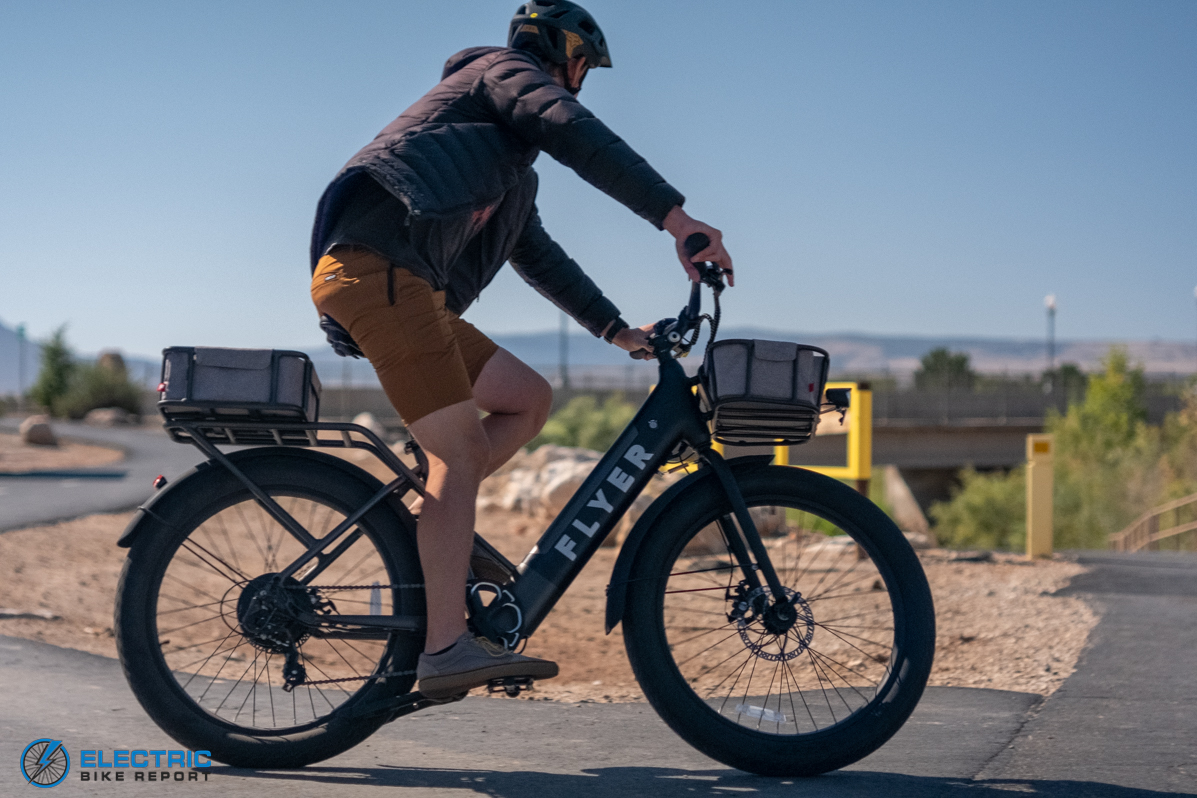
For a bike designed — at least in part — with cargo capacity in mind, the M880 handles very nicely.
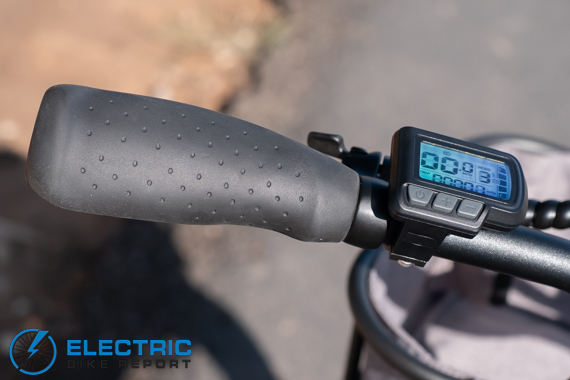
Ergonomic rubber grips for the hands.
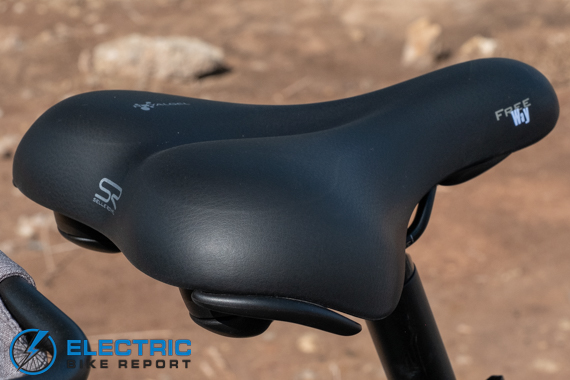
The Selle Royale FreeWay saddle is one we’re seeing more and more on affordable e-bikes.
Radio Flyer M880 Specs/Features Review: Electric Components
Motor
The Radio Flyer M880’s 500W rear motor has a really solid amount of power for this type of bike. It’s certainly not designed to be a speed racer, but for the commuter looking for a quick but predictable power profile the M880’s motor is a good match.
On throttle it works great, and when pedaling from a dead stop the motor engages quickly and gets you up to the max motor-assisted speed of 20 mph without much trouble. Even on hills the bike performs nicely, clearing even some of the tougher climbs in our area. Where the issue is, is in the motor’s power delivery at the top end of its power band.
If you stop pedaling and coast at speed, think in the ballpark of 17 mph to 20 mph, the motor engagement is gentle and subdued when you start pedaling again and it becomes fairly difficult to maintain your speed. The motor does engage quickly when you restart pedaling, so it doesn’t seem to be a cadence sensor issue, but rather the bike just accelerates slowly. It feels like a safety feature or a bit of controller programming designed to keep the bike’s acceleration safe and mellow, but instead is making it just a little tough to maintain speed.
I solved this problem by tapping the throttle for a few seconds when I wanted to accelerate quickly, which gave a little more punch to the motor, but I’d really like to see Radio Flyer give this bike a little more PAS gusto near the top of its speed range.
Battery
The Radio Flyer’s 720WH battery is impressively large for its 500W motor, giving the bike a really solid range. It’s also nicely integrated into the downtube and you can remove it to charge off the bike or store it inside.
We were really surprised by how far this bike went on a single charge — unless your commute is way above average, you’d be hard pressed to run this thing low on charge.
Pedal Assist / Throttle
The Radio Flyer M880 has a pretty standard five levels of pedal assistance plus a half-twist throttle on the handlebar.
While we did choose to conduct one of our range tests in PAS 2 because of how light the assistance is in PAS 1, it’s tough to knock the bike for this. Quite frankly, most of the affordable e-bikes we test have a PAS 1 that gives such little assistance it’s hardly usable. On Class 2 e-bikes in particular it’s difficult to break apart the power profile into five distinct settings.
The throttle, however, worked really well and was arguably the snappiest way to engage the Radio Flyers’ power.
Display
The M880’s display is a pretty standard unit for a sub-$2,000 e-bike that gives you metrics such as speed, trip time, distance traveled and a few more things. It’s also got buttons to toggle through the various PAS settings and to turn the bike on and off.
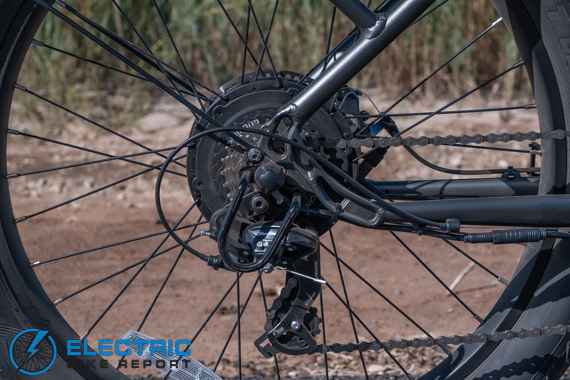
A 500W rear hub motor keeps things assisted.
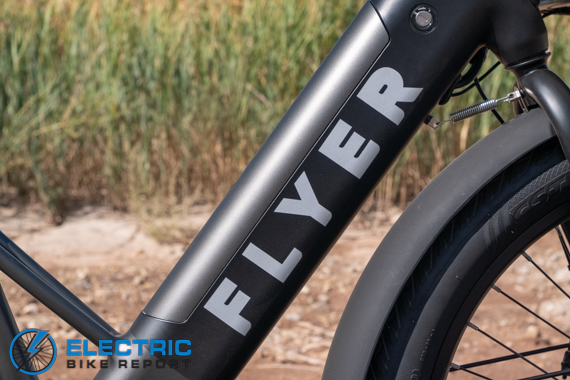
The M880’s 720Wh battery is integrated into the frame.
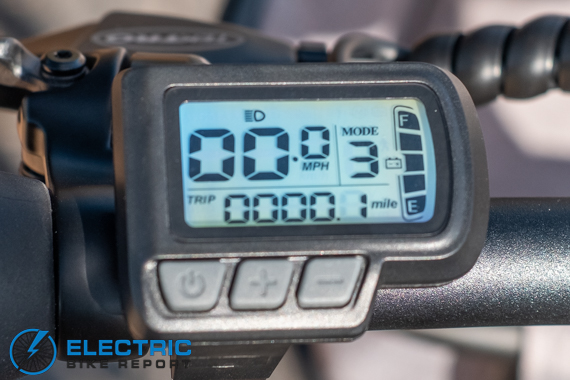
It’s not the fanciest display, but it works well and is a little more discreet.
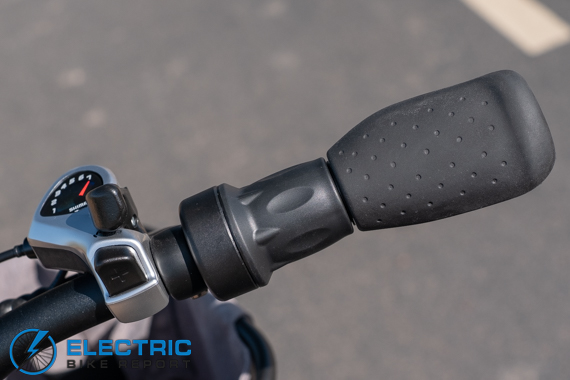
Radio Flyer uses a half twist throttle on the M880.
Radio Flyer M880 Review: Components and Accessories
With hydraulic disk brakes, really high quality tires and a very cool catalogue of accessories, the Radio Flyer M880 is a solid value e-bike for less than $2,000. The component package suits this bike well and everything meshed together as it should.
Brakes
Despite the M880’s weight and mechanical disc brakes, which typically are slightly less powerful than their hydraulic counterparts, the Radio Flyer had an impressive showing during our braking test.
We run each bike we review through a series of brake tests from 20 mph to get an idea of how quickly the bike stops from speed. The test is run five times and we take the average to get our results.
The Radio Flyer M880 came to a stop with an average braking distance of 12-feet-2-inches, an above average result we were really pleased with. I think this result is owed, at least in part, to those semi-slick CST tires. Not only do they grip well, they’re slightly wider giving the bike a larger contact patch. That, plus the M880’s balanced weight distribution, slowed things down quick.
Frame
The 6061 aluminum frame uses a cool truss-like design that incorporates the rear rack into the structure of the frame, making the rack stronger and giving the frame a very cool look.
Radio Flyer calls the M880 a “midtail” electric cargo bike, meaning it’s got much of the carrying capacity of a full-size cargo bike with the wheelbase and maneuverability of a traditional e-bike. I personally think they nailed it with this frame. Not only is it functional but it looks really nice.
We did notice that the frame felt pretty rigid on rougher roads, but those larger tires helped smooth things out.
Drivetrain / Shifting
Connecting that 500W rear hub motor to the cranks is a Shimano Tourney 7-speed drivetrain.
This is a pretty typical groupset we find on a sub-$2,000 e-bike that works well and helps keep costs down. I found the Radio Flyer M880 to be an e-bike that really favors frequent shifting, so I’m glad they opted for a name brand component manufacturer.
The gearing additionally felt appropriate for the bike’s Class 2 speeds — the smallest cog is enough that I’m not spinning out at the bike’s top speed and the easiest gear was plenty for steeper hills.

The Radio Flyer M880 is a looker.
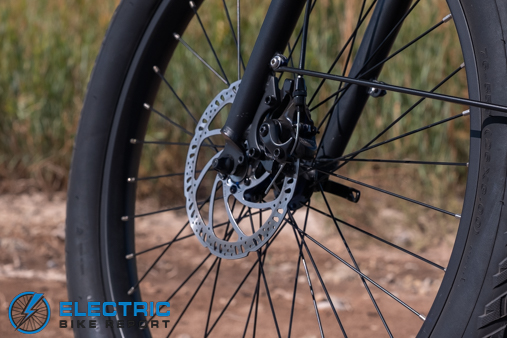
Tektro Aries mechanical disc brakes handle the stopping.
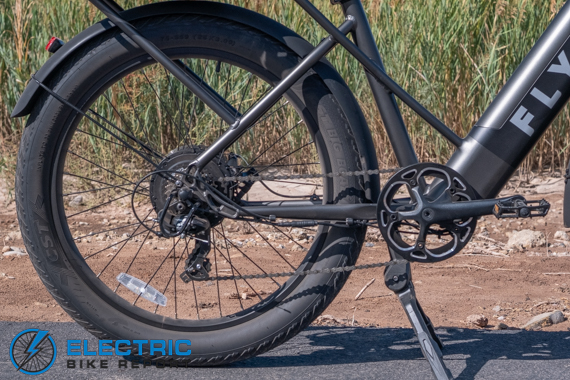
The M880 used a Shimano Tourney 7-speed drivetrain; a budget option that still works well.
Contact Points / Comfortability
All the points where your body touched the bike — the seat, grips, handlebars and pedals — all meshed together well and made for a comfortable ride.
Radio Flyer Spec’d the M880 with a set of ergonomic rubber grips, which I personally prefer over the more aesthetically-pleasing faux rubber grips that are very popular right now, and the bike is equipped with a Selle Royale Freeway comfort saddle.
I’m not a huge fan of this saddle, but take that with a grain of salt since no two butts are alike. It’s an extremely popular comfort saddle we see spec’d on e-bikes, but it just doesn’t mesh great with my bum — especially during long stints on the bike. But for those looking for a very broad and supportive saddle, you may find it fits well.
Tires
The CST Big Boat tires are new to Electric Bike Report’s team of e-bike reviewers, but they’ve quickly become one of our favorite pavement-oriented e-bike tires.
The Big Boats are 3 inches wide and fitted to a set of 26-inch rims. In addition to the stopping power I mentioned above, I was really impressed with how nicely these tires rolled and stuck to the ground in corners. Despite its weight, the M880 was easy to pedal.
Extras / Accessories
I love the Radio Flyer’s front and rear storage baskets. These are optional accessories that will cost you a bit more, but I’d argue that they’re well worth it. The baskets themselves are your standard-issue metal baskets that mount to the Flyer’s integrated rear rack and a four-bolt mounting system on the front, but where they really got me was with their canvas liners.
These liners appear to be water repellant, have some nifty elastic loops to hold water bottles or travel coffee mugs and — this is the best part — each liner sports a zippered pocket that perfectly fits a large cell phone, wallet and keys. As someone who hates pedaling with the weight of keys or a phone in my pockets, I can’t tell you how much I liked the pockets. They’re located in an area that’s accessible while riding (if you’re comfortable doing that).
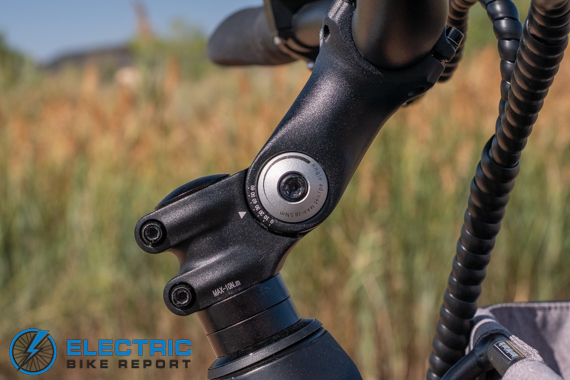
The M880 has an adjustable stem that makes the cockpit a little more customizable.
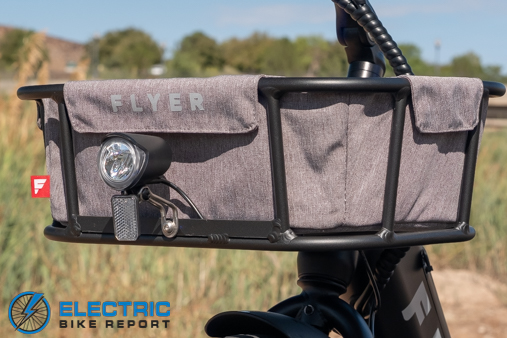
The front and rear baskets are optional accessories, but I’d suggest springing for them. They’re very functional, have zipper pockets and are nicely done.
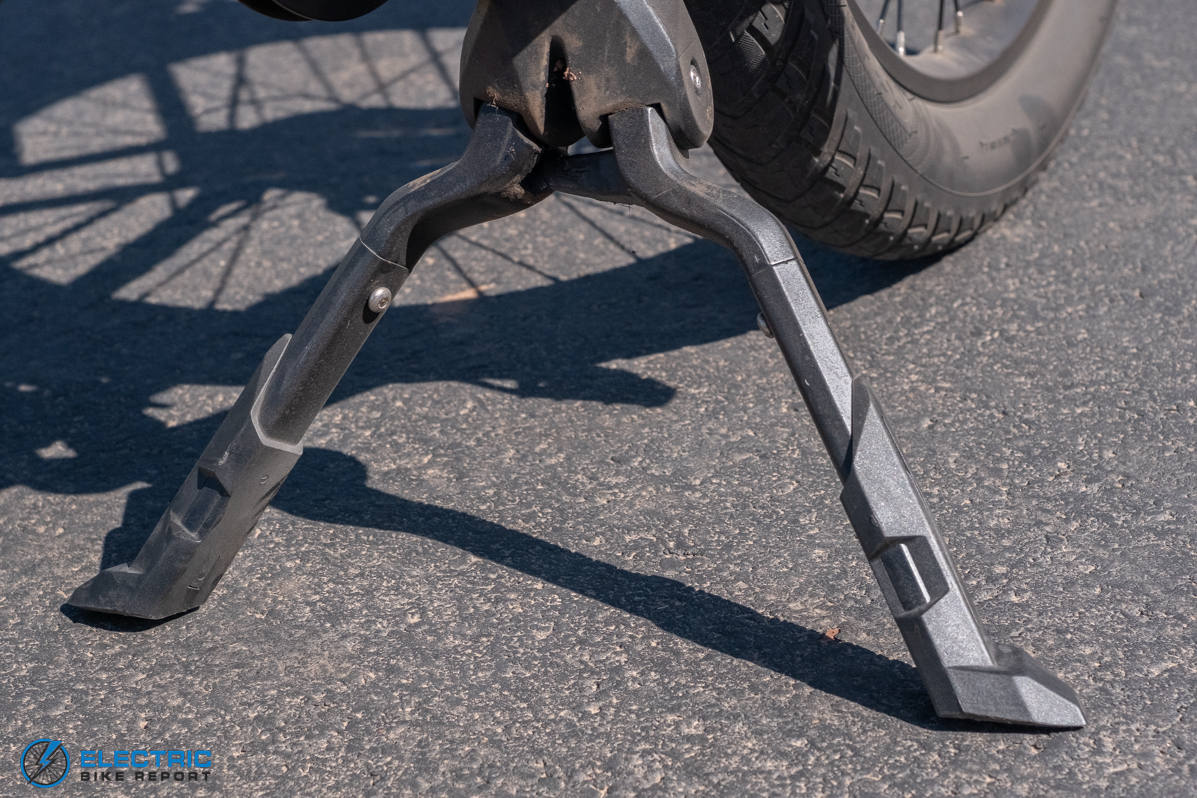
The moped-style kickstand holds the bike upright and is super stable. We wish more e-bikes would come with this style kickstand.
Radio Flyer M880 Review: Summary / Where to Buy
If you like your e-bikes with a dose of nostalgia, the Radio Flyer M880 may be a bike to look up.
But Radio Flyer’s first batch of e-bikes have much more going for them than just name recognition. The Radio Flyer M880 we reviewed is just a holistically good e-bike; it strikes a nice balance between utilitarianism and fun that makes you want to spend more time in the saddle.
I was thoroughly impressed by the bikes design, it’s 300 lb payload capacity, and frankly its price — Radio Flyer did a great job of piecing together a quality e-bike at a price that’s inviting to first-time e-bike buyers. Radio Flyer clearly paid a lot of attention to accessories, too. The racks we tested were functional, had a higher weight capacity than many other racks we see on affordable e-bikes and had cool features like zippered pockets and cup holders.
It’s range is bar none in the affordable category, and while we had a few notes on the motor, I was overall pleased with the bike’s exceptionally smooth power delivery that felt measured and safe. Not all e-bikes have to be speed demons, and this one did a good job on capitalizing on all other elements of e-biking — ranging from user friendliness to overall comfort.
The Radio Flyer M880 is available for purchase through Radio Flyer’s website and will be shipped directly to your door.
‘Happy Riding, make sure to let us know if you have any questions down in our comments section or if you think we left anything out in this review of the Radio Flyer M880
Reader Interactions
![]()
Source link






